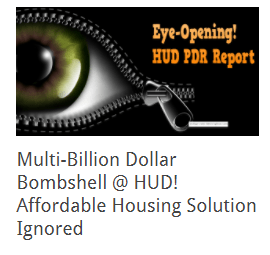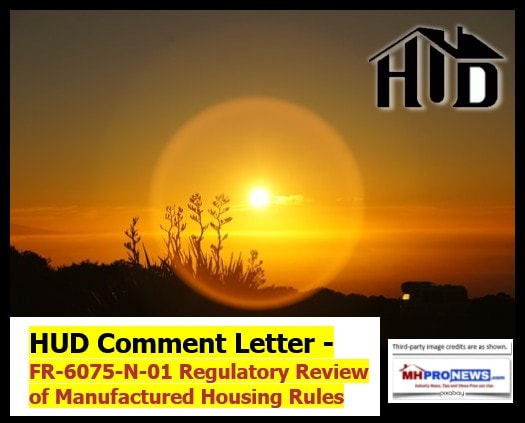
The Daily Business News reported yesterday about the looming deadline for comments to HUD about regulatory reforms desired by industry members, home owners, and others interested in manufactured housing.
Federal Manufactured Housing Program Review Comments Due Next Week, 2.26.2018
The message below reflects the essence of a comment letter
by this writer going to HUD, per their request for
manufactured housing program regulatory reform comments.
For more details on submitting your own comments, click the article linked above.
Dear HUD Secretary Ben Carson, MD,
A year and one month have gone by since President Donald J. Trump and Vice President Mike Pence have taken their oath of office.
As Juanita Duggan, President and CEO of the National Federation of Independent Business (NFIB), or Jay Timmons – President of the National Association of Manufacturers (NAM) have observed, the improvements in America’s economy and general confidence have soared.
Unemployment among all groups has improved in the last year, but it is particularly noteworthy among minorities and women.
The Trump Administration’s policies have yielded real wage growth, and numerous record economic milestones, in just 13 months.
But when that gaze is cast upon manufactured housing (MH), a different reality exists.
That is the focus of this MH Industry professional’s plea for regulatory relief of the much-needed, appealing, quality home product provided by manufactured housing professionals.
Reaching for the Sky, Multiple Level HUD Code Manufactured Homes
As the affordable housing crisis rages, with over 8 million housing units are needed now, per HUD, National Association of Realtors (NAR), and the National Low Income Housing Coalition (NLIHC) research – manufactured housing languishes at relatively low levels.
Why?
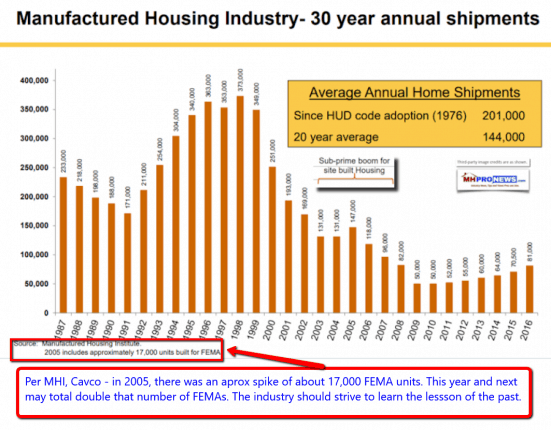
State of the Manufactured Home Industry, Comparing RV vs. MH Data
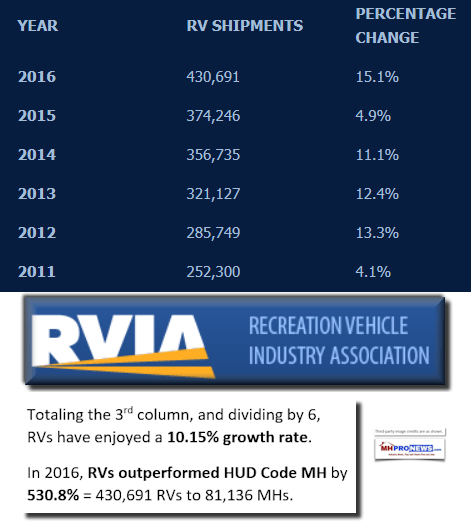
As industry professionals and investors say, the industry’s realities are both simple, and complex.
What is easy to grasp is this reality. The primary regulator for manufactured housing is the Department of Housing and Urban Development (HUD).
The first common-sense “ask” ought to be is that the steps needed to bring to HUD’s jurisdiction back over those regulatory functions sent to the Department of Energy (DOE) ought to be taken. There is no logic to having more than one federal regulator that deals with construction, safety, and energy efficiency.
The second ask is related to the simple-yet-complex realities of our unique industry.
Wikipedia says that in 2014, over 14,000 people were employed by HUD. Consider this. Pick 10 of those 14,000 employees, none of whom should have ever worked in HUD’s manufactured housing program office. Only one of those ten should have any first-hand experience with modern Manufactured Housing (a ratio roughly equal to the national average).
Once selected, have those ten HUD staffers enter a 2-to-4-week guided immersion into the MH Industry, and its realities.
Then have those ten do a questionnaire before they begin their immersion, and then once more immediately after they finish. That will establish a snapshot of their perceptions before and after their educational/research experience.
If they are like so many others we’ve introduced to the industry, odds are good that those proposed HUD staffers will have an epiphany.
With the proper guidance, those ten will discover that perhaps the single best resource of solving the affordable housing crisis is being regulated by HUD, i.e.: HUD Code Manufactured Housing.
Those ten should then participate in a meeting with you – HUD Secretary, Dr. Ben Carson – along with others in the agency’s MH program chain of command.
HUD will then have ten team members who could become a valuable resource for your agency in shedding light on just how billions of dollars could be saved annually at the federal, state and local levels by properly applying existing laws.
Enforcing existing federal laws, and by leveraging mostly private enterprise, could solving the bulk of the affordable housing crisis. Doing so would save taxpayers, create about half-a-million jobs (+/-), and would establish a ladder for wealth-creation to those who become the owners of those manufactured homes.
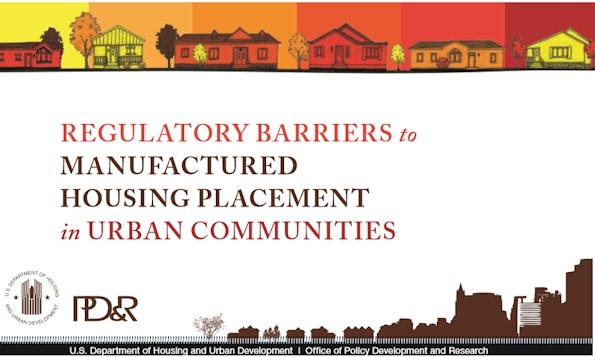
HUD’s leadership could – through this process – have an understanding that has never before been attempted or achieved by the regulators of HUD Code manufactured homes.
That suggested process could yield a report by the 10 proposed HUD staffers. It should ideally be followed up by having you – Secretary Carson, top HUD management, and other key staffers – spend 2 days in a similar immersion process. Doing this would transform HUD and affordable housing in America, based upon facts.
Congress had a vision for HUD Code manufactured housing when they passed the legislation in 1974 that resulted in the creation of manufactured housing, starting on June 15, 1976. That act was designed to specifically address the problems that existed in the industry during the mobile home era, while providing a dependable private sector resource for largely unsubsidized, safe, durable, and economical housing.
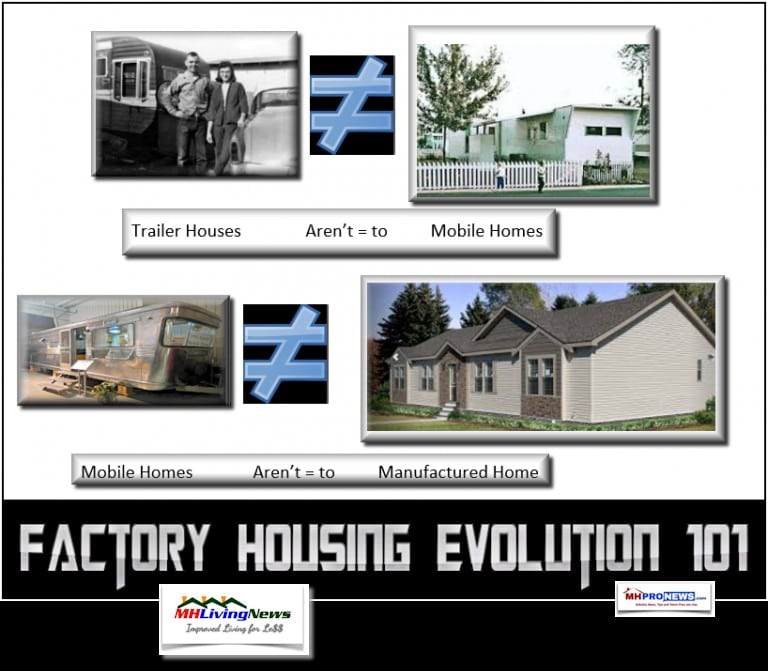
Until regulators understand what the modern manufactured home realities and potential are, the program will never achieve the potential that the GAO and other third party researchers have believed is possible.
The report below was published on 12.14.2014, and is as relevant now as it was then. It includes the GAO study, and the Manufactured Housing Improvement Act as downloads, which along with other linked material, ought to be considered as part of my comments letter.
14 Years – Time to Revisit the Manufactured Housing Improvement Act of 2000?
We reported on major publications and media outlets, that have touted manufactured homes as part of the solution for the affordable housing crisis.
Bloomberg, HousingWire, Realtor and Fox all suggest Manufactured Homes as Important Solution for Affordable Housing in America – manufacturedhomelivingnews.com
Bloomberg, HousingWire, Realtor and Fox all suggest Manufactured Homes as Important Solution for Affordable Housing in America, Patrick Clark, Bloomberg, Brena Swanson, HousingWire, Mari
On MHLivingNews.com we take mainstream reports, and often highlight how the information they produce ought to be understood through the lens of manufactured housing.
How Can You Avoid the “Hidden Costs” of Buying A House? Just the Facts! – manufacturedhomelivingnews.com
How Can You Avoid the “Hidden Costs” of Buying A House? Just the Facts! Avoid, hidden costs, buying a house, manufactured home living news, compare, buying conventional, site built house, compare buying manufactured home,
Background
I came to America by way of Hungary from Iran. My father was involved in housing and construction most of my life. My educational background is in medicine, which is to say, science. As HUD Secretary Dr. Carson understands, science is about evidence, testing, and facts. Had the complex medical issues of our son Tamas not existed before his birth and for the years since, I’d be practicing medicine in the U.S., where I passed my medical examinations.
My degree from a European university in Hungary came “cum laude,” “with honors.”
I speak 3 languages and can read Arabic to a reasonable extent.
My article in support of then candidate Donald J. Trump was posted for several months on the president’s campaign website. It was picked up by thousands of others too.
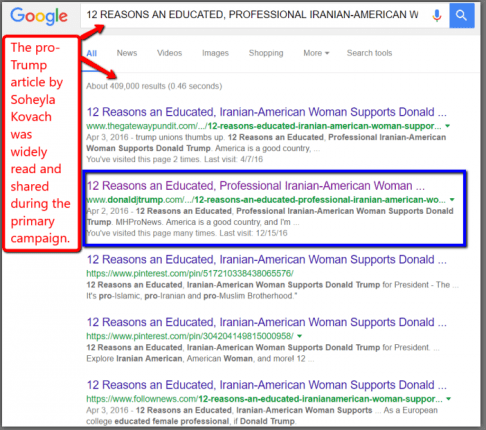
My husband, L. A. “Tony” Kovach, has spent over 25 years in the Manufactured Housing Industry. I began working with him in various ways in this industry over a dozen years ago. We’ve lived in several manufactured homes, typically in a land-lease community setting. We’ve worked together for many years in this industry, and have been to retail centers, communities and manufactured home production centers from coast-to-coast and border-to-border. . So, unlike many in Washington, we have true first-hand knowledge and understanding about manufactured homes today.

Over 9 years ago, we began publishing what is now known as MHProNews. About 6 years ago, we began publishing MHLivingNews.com. Both are widely considered to be the top resources of their kind in the industry, each enjoying millions of page views and visits annually.

For a relatively small industry, that high level of engagement by the public and professionals alike should speak volumes.

We’ve been doing video interviews for about 4 years, and written interviews for about 8 years.
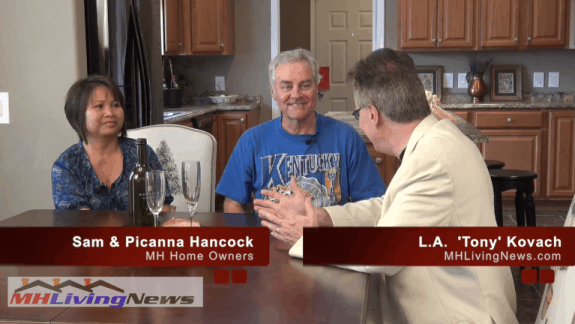
Perhaps no one in the industry today has interviewed more:
- professionals,
- actual manufactured home owners,
- and informed experts,
about manufactured housing than our operation has.
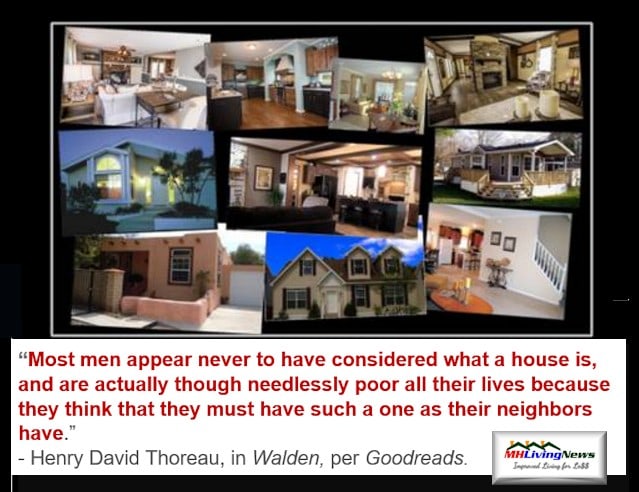
I’m a co-founder and managing member of LifeStyle Factory Homes, LLC, with my husband Tony as the other co-founder and managing member.
While we are pro-industry, we have never turned a blind eye to the cases of failures, fumbles, frustrations, and fears found in our industry. So, in our trade publishing, we’ve covered the good, bad, and ugly. Again, as a scientist one does not advance based upon mere wishes, advancement depends upon evidence based understanding, followed by appropriate action.
Frank Rolfe, MHU/RV Horizons Protest by MHAction; Nathan Smith/SSK/MHI Flashbacks?
We also do consulting and business development services for the industry, and also for those who are entering or researching the MH Industry.
All of that and more gives our work – and hopefully these comments to you – credibility.
We routinely hear from – and engage with – the industry’s professionals, from operations of all sizes. While I’m not anywhere nearly as active on LinkedIn as my husband is, Tony has had more recommendations and endorsements – over 1,000 – than perhaps most anyone in the industry. He likes to say that should be considered a reflection on our team’s work.
The first points to make against that backdrop are the following.
If Manufactured Homes Today are Such a Good Value, Why Isn’t the Industry Doing Better?
I) When newcomers and researchers (investors, non-factory built housing pros, media, others) begin to grasp the amazing value found in manufactured housing today – as opposed to the outdated myths – they often ask a variation of the following. ‘Why isn’t the industry doing much better than it is?’
It’s a question we’ve dealt with at various times and ways, including our report on a powerful insight by Harvard researcher, Eric Belsky, who said this.
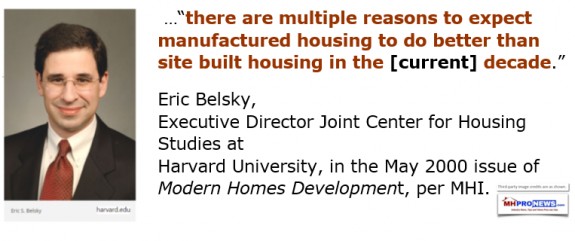
So, we’ve explored that issue several times before. But most recently we did so in doing our analysis and fact-checks about the Urban Institute report on manufactured housing.
Those Urban Institute reports need to be read, please see those linked below, which we hope you will consider as part of this request for comment.
“Follow the Money” – Controversial Urban Institute Report on Manufactured Housing
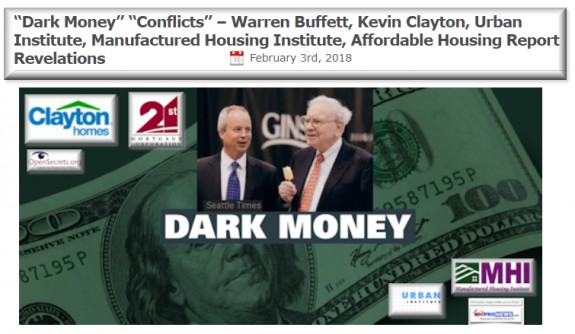
Note that the Urban Institute (UI) specifically mentions the comprehensive review that HUD is undertaking, and to which my comments are responding. It is therefore reasonable to presume that UI wished to influence HUD with its controversial analysis.
It must be noted what the U.S. Census Bureau and others have documented, namely, that manufactured homes cost about half of what conventional on-site built house does to build. While some believe that is because of the use of cheap materials, HUD above all ought to know better. There are entry level manufactured homes, that do use lower cost materials, such as ‘wrapped cabinets’, which are also found in apartments and entry-level conventional housing.
“The Solution to the Affordable Housing Crisis is Hiding in Plain Sight” – manufacturedhomelivingnews.com
“The Solution to the Affordable Housing Crisis is Hiding in Plain Sight”
Then there is also residential style manufactured homes. The interview and video linked below walks a newcomer through a better understanding of those distinctions between ‘shade and shelter’ homes,, and those that rival far more costly manufactured homes. Note that among the videos on the page linked below are professionals who opted for manufactured homes. They could have purchased conventional housing, but saw the wisdom of manufactured homes. The other video on that page is with Stan Dye of Star Homes in Culman, AL. Dye specifically addresses the issue of enhanced preemption, and expresses that thought to HUD Secretary Carson.
Rapid Acceptance of Energy Star Rated, Residential-Style Manufactured Homes Proves Need, Value as Affordable Housing Solution – manufacturedhomelivingnews.com
Rapid Acceptance Energy Star Rated, Residential-Style Manufactured Homes Proves Need, Value Affordable Housing Solution, John Bostick, Lindsey Bostick, Sunshine Homes,
- II) Facts, Frustration, Fumbles, and Fear
The typical channels of industry communications have in many cases been influenced, corrupted and undermined, as the links below reflect. That’s a bold claim that merits evidence. We will use the word “allege” to refer to any and all references that involve third parties, because MHI connected attorneys, and MHI surrogates, have directly and indirectly threatened MHProNews in writing with litigation over our investigative reports. That said, we have always offered evidence to back up any allegation, and they have not to date filed any actions. Why? We believe it is because our evidence backs up the alleged concerns.
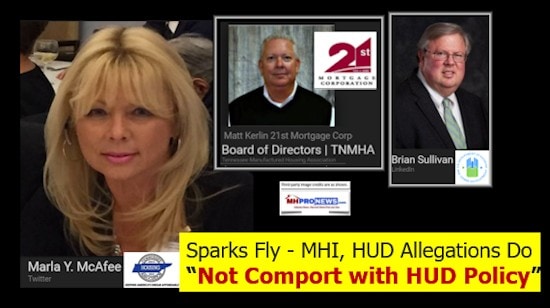
Since the report below was published, more state association executives confirmed what the initial state executives who tipped MHProNews said that sparked that account.
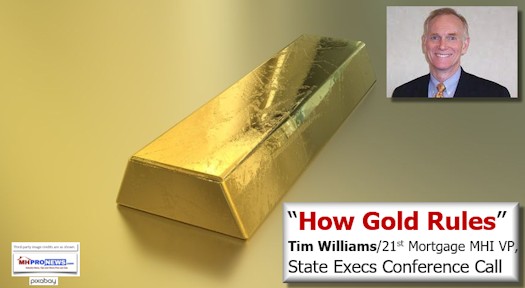
Even some who are not MHI members fear making a public comment about the harmful direct-or-indirect impacts allegedly caused by Berkshire Hathaway owned operations and the Manufactured Institute (MHI) that they dominate. See one of several possible examples in the “Sparks Fly” report linked above.
Another example.
Negative media accounts, for instance, are often unrelated to MHI, though some may involve a member company.
But MHI – that Arlington, VA based MH Industry Trade Association’s – failures to engage with media, researchers, or others leaves a problematic view of manufactured housing largely unaddressed. So, while MHI don’t necessarily cause an issue, they allow it to go routinely unaddressed.

The REAL Truth, vs. Fake News, About Modern Manufactured Homes
Even when we were members of MHI, they typically gave little or no support for our pro-industry, pro-growth efforts. Why? The balance of this letter and links report help answer that question. But the link immediately below sheds light on that ‘why.’
The Masthead
What Tim Williams 21st Mortgage, Richard Dick Jennison, MHI President and CEO, Rick Robinson, SVP General Counsel, Lesli Gooch, SVP, Taught, Manufactured Housing Institute, MHI,
Typical associations will promote any good news about its products or services, regardless of the source. So why has MHI not spotlighted “good news” about manufactured home reports, such as those linked below?
Weather Expert’s Surprising, Bombshell Statement on Tornado Deaths and Affordable Manufactured Homes – manufacturedhomelivingnews.com
Weather Expert, Greg Schoor, National Weather Service, Surprising, Bombshell Statement, Tornado Deaths, affordable Manufactured Homes, not mobile homes, not trailer houses,
Researchers Shake Up American Dream? Rent vs. Buy, Ken Johnson, Florida Atlantic University, Exclusive to ManufacturedHomeLivingNews – manufacturedhomelivingnews.com
Researchers Shake Up American Dream? Rent vs. Buy, Ken Johnson, Florida Atlantic University, Exclusive to ManufacturedHomeLivingNews
Hurricane Irma Florida Survivor Relates First-Hand Manufactured Home Safety, Durability Experience – manufacturedhomelivingnews.com
Hurricane Irma, Florida, Survivor, Relates First-Hand, Modern Manufactured Home, Safety, Durability, John Jenkins, Florida Manufactured Housing Association, FMHA,
Elected Official Explains Surprising Modern Manufactured Homes, Video Interview – manufacturedhomelivingnews.com
Elected Official, James Hanning, Wagoner County, OK, County Commissioner, modern Manufactured Homes, Video Interview, Video captured at LIfeway Homes, Tulsa OK, in Sunshine Homes model home,
Now these and dozens of other points are significant for HUD’s understanding and review of the manufactured housing program.
Why? Because MHI postures advocacy for the industry, but fails to take some of the most common-sense steps to make advocacy or lobbying for effective. Who says? Often, it is award winning MHI members.
Marty Lavin Lashes the Manufactured Housing Institute’s (MHI) Latest Initiative
Logic demands that one answer the questions, why would MHI fail to do their best for the industry at large? To what end or purpose?
Answer? So that thousands of MH Industry Independent retailers, communities and producers can increasingly be consolidated by a handful of large and/or well-connected companies.
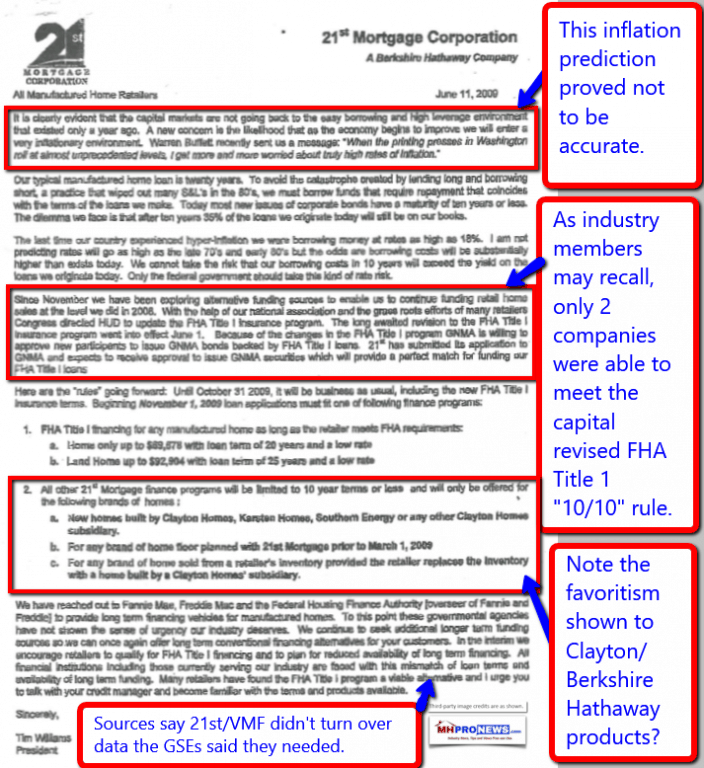
This isn’t just conjecture or incendiary claims, as the document above and the linked reports reflect. It is the obvious reality to any who study Warren Buffett’s own words, or what Kevin Clayton said in the video interview, found in the linked reports below. Again, as with other links, I’m requesting that the linked material be considered as part of this report.

Kevin Clayton Interview-Warren Buffett’s Berkshire Hathaway, Clayton Homes CEO
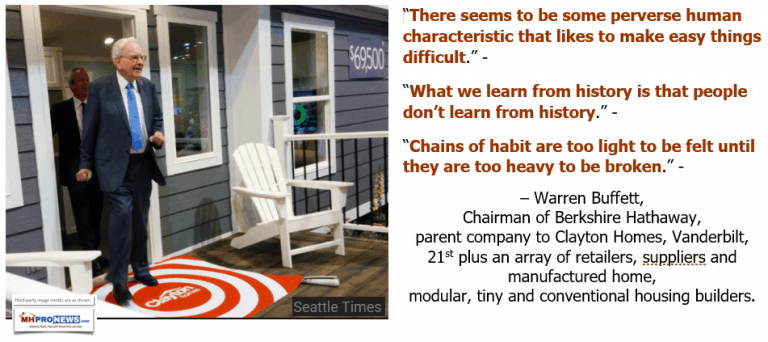
Stating the obvious for clarity.
It must be noted that there are those who agree with these assessments, those who disagree, and others who are on the fence. That said, sources within MHI, Berkshire Hathaway owned companies, independents and others follow such reports carefully. They do so by the thousands, in a small industry. MHI and Berkshire Hathaway owned brands have been given numerous opportunities to respond or debate these claims.
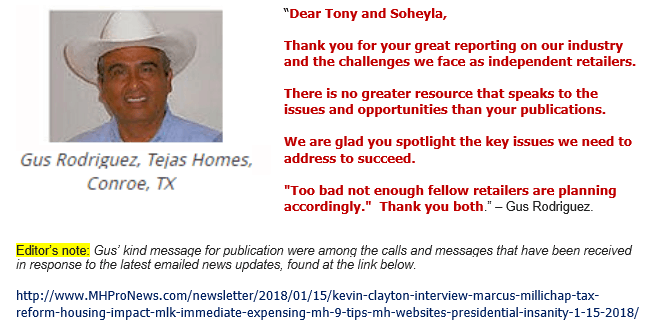
MHI and Berkshire Hathaway connected firms have not accepted those offers, why not? If these concerns would be easily disproven, why wouldn’t they reply or debate?
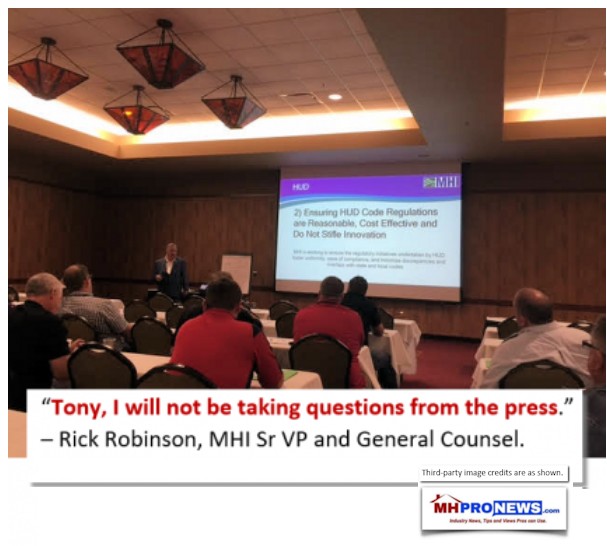
Again, the reason this is important is that the Trump Administration, Dr. Carson and others must understand that while they are not responsible for what MHI does or does not do,
- the regulatory burdens that the industry has operated under,
- combined with the other aspects of the Buffett/Clayton “Moat” principles,
- have led to a significant consolidation of the industry since Clayton was acquired by Berkshire Hathaway in 2003.
For proof, see the MHI graphic, below.
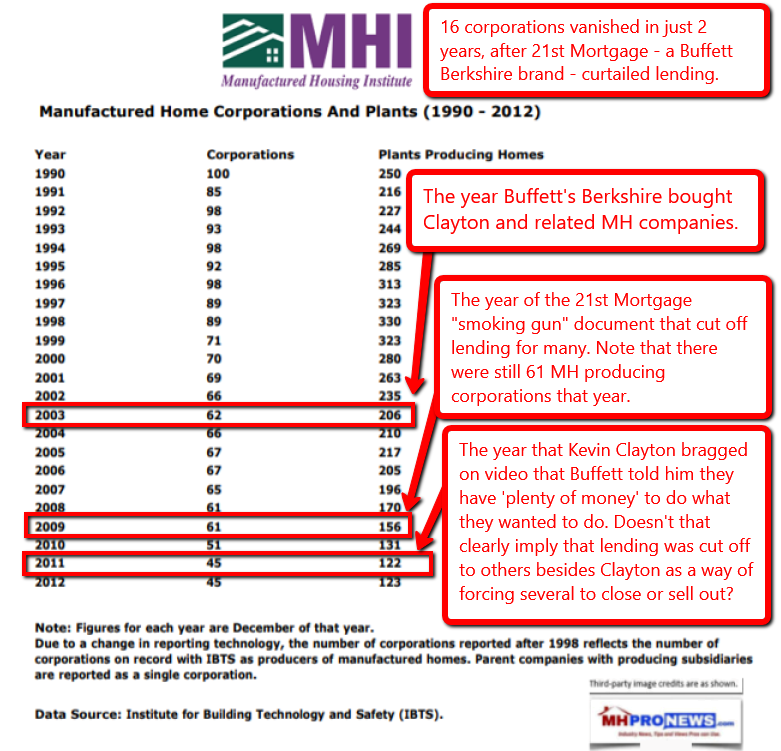
That same pattern of regulatory, finance and other forces have caused thousands of independent retailers to fail or sell out to larger companies. All of that has contributed to the affordable housing crisis.
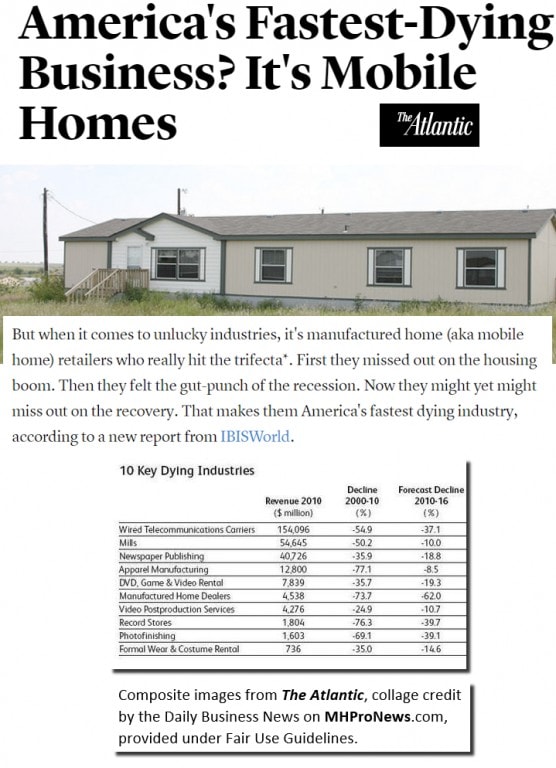
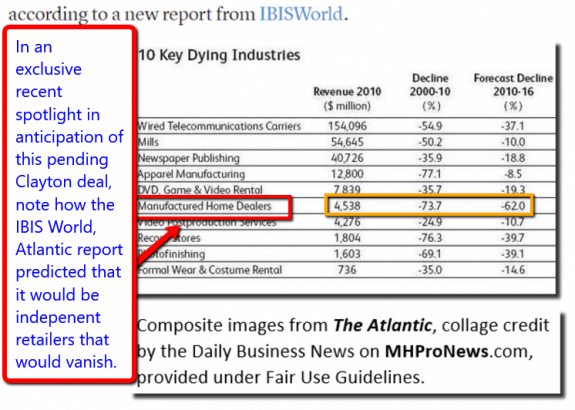
These are examples of why my “third ask” of HUD is important. Namely, that a referral be made to the Department of Justice (DOJ) and to the Federal Trade Commission (FTC) to investigate the numerous claims of monopolistic practices by us and others that Berkshire Hathaway owned units involved in manufactured housing be investigated for anti-trust violations. The same principle that tonight’s market report video reported, applied to Berkshire Hathaway, points out why the Trump Administration ought to pursue a breakup of Berkshire Hathaway, one that HUD could support by a referral.
Analogies That Teach Manufactured Housing Investors, Owners – Plus MHMarket UPdate$
What Can HUD Do and Consider About Regulatory Reforms?
Part 1 – Begin with Understanding
The foundation of regulatory reform must begin with an honest understanding of manufactured housing and the industry’s realities. The links in this article would be just the start of such an understanding.
Common sense alone demands that a reality-based understanding of the what is vs. the outdated misconceptions regarding manufactured housing.
Then, HUD must grasp how Berkshire Hathaway owned units and their MHI non-profit are utilized to minimize the industry’s production. Why?
Because there is evidence that Pam Danner was helped by one or more MHI staff members to get and keep her job as head of the manufactured housing program as a result their influence. While she is now removed from the program, understanding what happened, and why is critical to avoid it occurring again.
George Gunnell, WVMHI, Citing FMHA’s Jim Ayotte, Says HUD’s Pam Danner Must Go
MH Pros List “ABUSES” by Pam Danner, Current HUD Manufactured Housing Program Administrator
HUD’s Pam Danner Announces former MHI VP Lois Starkey Joining HUD
While MHARR, some MHI members, and others have voiced concerns about Clayton Homes and other BH owned units oversized influence over MHI, similar concerns have been expressed by
- Maxine Watters (D-CA),
- other Democratic legislators,
- the Center for Accountability,
- CFED rebranded as Prosperity Now,
among others.
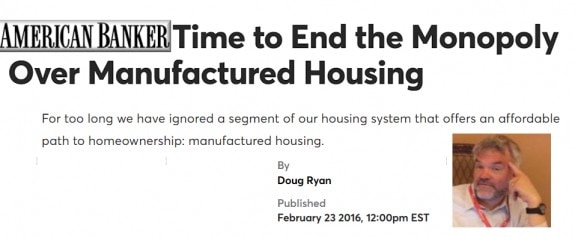
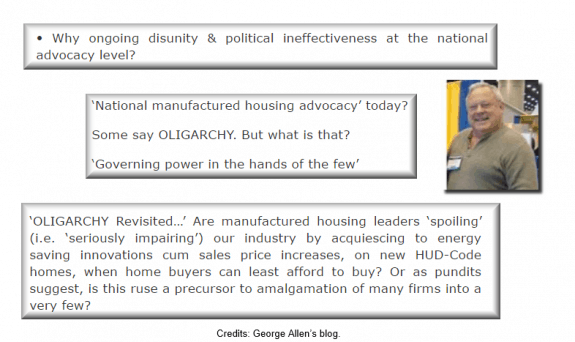
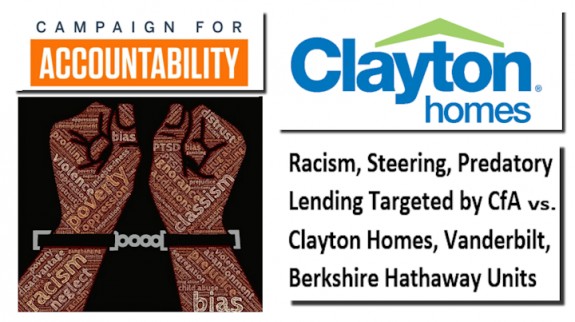
Warren Buffett is widely seen as a shrewd investor. He is wise enough to allow heavy regulations to continue unabated by the association he dominates, as part of a broader plan to “widen the moat” of Clayton Homes, 21st Mortgage, Vanderbilt, et al within the manufactured home industry.
For that MHI charade to work, they arguably must have enough ‘efforts’ that appear to busy, smaller industry players that MHI are trying to mitigate regulations.
The Top Twelve Questions for Manufactured Housing Institute (MHI) CEO, Richard “Dick” Jennison
Manufactured Housing Institute (MHI) Shifts on DOE Regulatory Rule, Report, Analysis
NAHB Report – High Cost of Regulations Impact Housing – and Manufactured Housing
But the reality is that it is often only after months of spotlighting the flawed positions of MHI that they finally pivot to the position they logically ought to have taken in the first place. The question is how can professionals so routinely make year after year of the same kinds of errors, and be rewarded for it, unless acceptable failure to mitigate regulations was part of the Buffett/Clayton goal?
If MHI actually wanted to mitigate regulatory burdens, they would more routinely work with MHARR to achieve the kinds of common sense reforms that would benefit consumers, still protect buyers, and give a level-playing field for players of all sizes.
The Pam Danner drama is a case in point, see those articles, linked above, plus this one.
The Masthead
Andy Gallagher, “Ousting” Pam Danner, Manufactured Housing Institute, MHI, Clayton Homes, RVP George Gunnell, West Virginia Housing Institute, “Transparency”, WVHI,
There were many voices calling for months – in some cases, for years – to have Danner removed from her role as the administrator of the HUD Code manufactured home program. MHI said and did many things, except ask for Danner’s removal. When others saw the wisdom of Danner being replaced, why not MHI? Why were they (once more) so late to the proverbial dance?
It fits with what Warren Buffett and Kevin Clayton have said about their use of nonprofits, foundations or other all resources necessary to expand their influence, control and power over the industry. It is a method for widening the Clayton moat.
See the links and videos from this page for more details, which again, I’m requesting be considered as part of my comments.
Then, consider what Alan Amy said about billionaires buying up the industry.
Or what the current and past president of MHARR had to say.
People and organizations are certainly within their rights to support whatever candidates they want. But where was the logic in Warren Buffett supporting first Barack Obama, and then Hillary Clinton, when the positions they took on issues such as Dodd-Frank were the opposite of what MHI claimed they wanted in terms of regulatory relief?
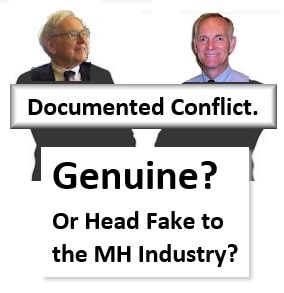
That only makes sense in the light of the premise that Berkshire Hathaway was willing to let heavy regulations help drive others out of business, or to cause them to sell out for less than their fair market value would dictate.
Manufactured Housing Institute VP Revealed Important Truths on MHI’s Lobbying, Agenda
Part 2 – Once Understanding Exists, Then the Actual Solutions Become Easy
First, enhanced preemption must become the lived reality of the industry. That single step would dramatically change the industry’s realities, and would open up affordable housing opportunities in cities and towns from coast to coast and border to border.
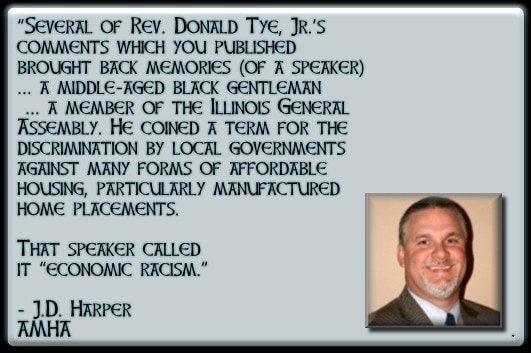
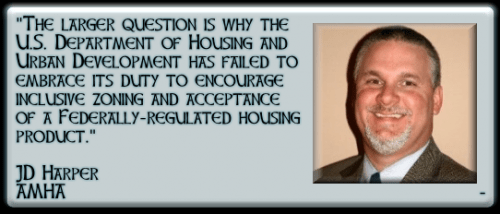
Meet Donald Tye, The Flashback Fast-Forward Face of Factory-Built Homes?!
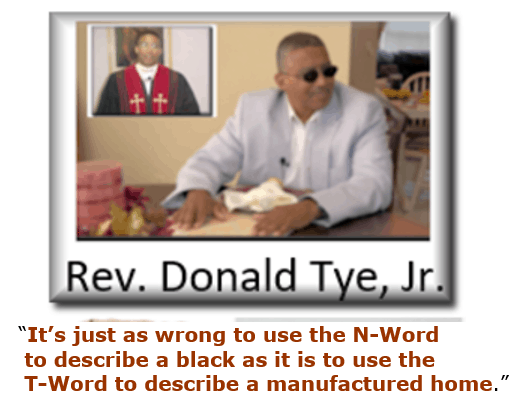
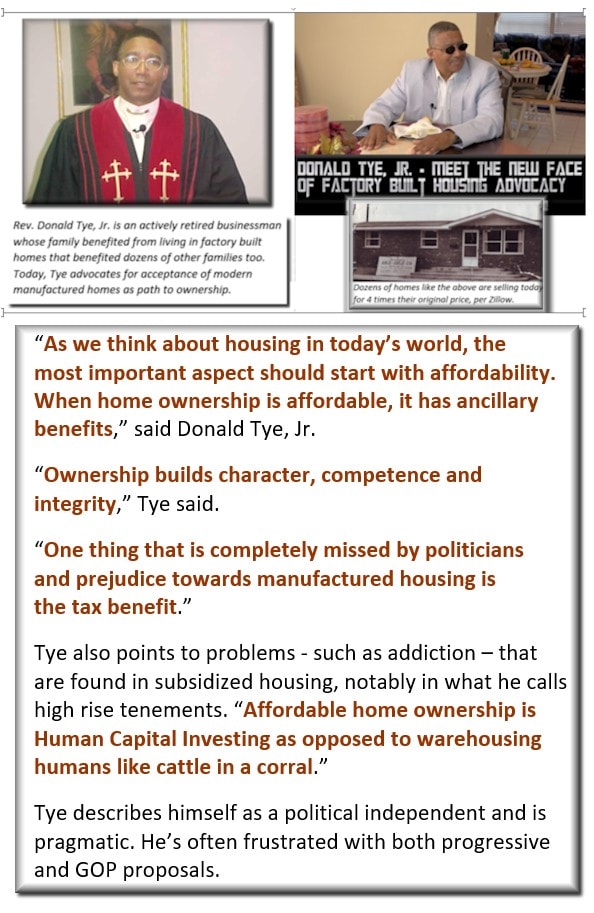
Two. The HUD Code is supposed to be performance based. See the video interview with prior program director, Bill Matchneer, in the report linked below. Any efforts to move the industry towards prescribed building standards as opposed to performance based standards is a misunderstanding and abuse of what the HUD Code is supposed to do.
Three. The 10/10 rule for FHA Title I loans ought to be immediately removed, and authority for making such loans be given to responsible, proven, industry lenders. The iron grip of Berkshire Hathaway over industry lending must be broken, if the industry is to thrive again.
There are also FHA Title II reforms needed, specifically that force a proper appraisal of manufactured homes on land-home or lease-hold scenarios. The Title II rules for use in leaseholds also need a modest tweak that ends the need for selling a community to resident ownership within 5 years. Doing so would open up market-rate lending to qualified buyers in lease-hold situations. Safeguards have already been tested more than a decade ago that demonstrate that can be done in a fashion that yields performing loans.
Entry Level v Residential Style Manufactured Homes, Modular Homes and MH Appraisals – Tom Papszycki, Arrowhead Homes – Inside MH Video Interview – manufacturedhomelivingnews.com
Compare entry level manufactured homes, residential style manufactured housing, modular homes, manufactured home appraisals, Tom Papszycki, Arrowhead Sales, Paris TN.
Four. Removable chassis. There is no logic for mandating that the frame and running gear must stay with the home. The industry has asked for this common-sense reform for about 20 years. It would save home buyers money, allow for a lower profile and more residential installation, plus is more environmentally conscious.
Five. There are comments already posted, and linked below, on topics such as on-site completion, frost free foundations, and other examples of HUD overreach that I’d like you to consider as part of my own comments.
Federal Manufactured Housing Program Review Comments Due Next Week, 2.26.2018
Six. The next administrator ought to be Vic DeRose, whom MHI and MHARR both agreed upon formally 4 years ago. He, or any other person selected for this role, ought to be a non-career appointee, as the law calls for in the Manufactured Housing Improvement Act of 2000.
Seven. Concepts were envisioned some years ago for the use of HUD Code homes in multi-story construction. In certain urban and suburban settings, these kinds of designs ought to be analyzed and put to work.
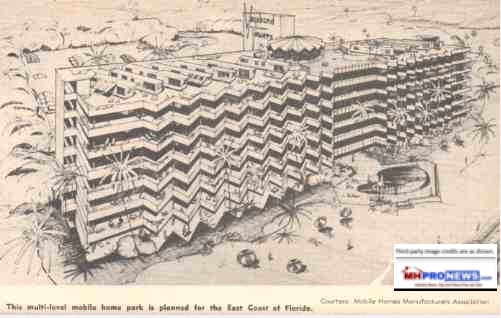
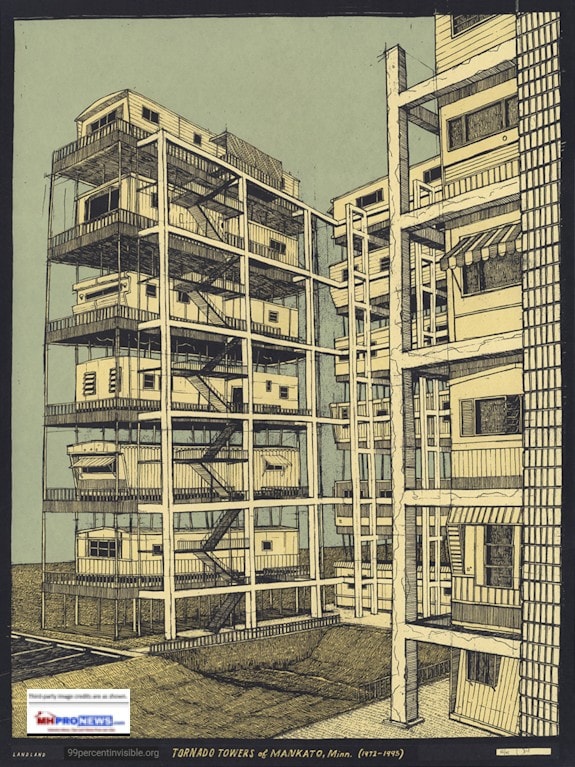
The Bottom Line
Vice President Mike Pence, who sources say is well informed on manufactured housing because he was governor in a HUD Code manufactured home producing state, said several times last year that the Trump Administration should be in the promise keeping business and should enforce the law.
If the Manufactured Housing Improvement Act of 2000, enhanced preemption and the points noted above are put to work, the cost for housing programs would come down naturally in the years ahead, because private enterprise would be free to create more affordable housing by using manufactured homes.
Thank you for your consideration of these thoughts and suggestions. Please consider our operation for any further needs that HUD may have in making these reforms a reality.
Respectfully,
Soheyla Kovach, MD.
—
Note: again, the above is a reflection of comments from this writer to HUD. Industry members and all others interested in manufactured homes can submit comments via the link below.
https://www.regulations.gov/comment?D=HUD-2018-0006-0001
For more details about submitting your own comments, click the article linked below.
“We Provide, You Decide.” © ### (News, analysis, and commentary.)

Thousands “Get It.”
Sign Up Today! Click here to sign up in 5 seconds for the manufactured home industry’s leading – and still growing – emailed headline news updates. You’ll see in the first issue or two why big, medium and ‘mom-and-pop’ professionals are reading them by the thousands. These are typically delivered twice weekly to your in box.
(Third party images, and cites are provided under fair use guidelines.)
Follow us on Twitter:
ManufacturedHomes
@mhmsmcom

Soheyla is a managing member of LifeStyle Factory Homes, LLC, the parent company to MHProNews, and MHLivingNews.com.

